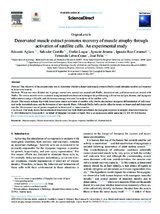Denervated muscle extract promotes recovery of muscle atrophy through activation of satellite cells. An experimental study

Ver/
Autor
Agüera, Eduardo
Castilla, Salvador
Luque, Evelio
Jimena Medina, Ignacio
Ruz‐Caracuel, Ignacio
Leiva-Cepas, Fernando
Peña, José
Editor
ElsevierFecha
2019Materia
Muscle atrophyMuscle denervation
Muscle extract
Myogenic response
Satellite cell
Skeletal muscle
METS:
Mostrar el registro METSPREMIS:
Mostrar el registro PREMISMetadatos
Mostrar el registro completo del ítemResumen
Purpose
The objective of the present study was to determine whether a denervated muscle extract (DmEx) could stimulate satellite cell response in denervated muscle.
Methods
Wistar rats were divided into 4 groups: normal rats, normal rats treated with DmEx, denervated rats, and denervated rats treated with DmEx. The soleus muscles were examined using immunohistochemical techniques for proliferating cell nuclear antigen, desmin, and myogenic differentiation antigen (MyoD), and electron microscopy was used for analysis of the satellite cells.
Results
The results indicate that while denervation causes activation of satellite cells, DmEx also induces myogenic differentiation of cells localized in the interstitial space and the formation of new muscle fibers. Although DmEx had a similar effect in nature on innervated and denervated muscles, this response was of greater magnitude in denervated vs. intact muscles.
Conclusion
Our study shows that treatment of denervated rats with DmEx potentiates the myogenic response in atrophic denervated muscles.
Fuente
Journal of Sport and Health Science, 8, 23-31 (2019)Versión del Editor
https://doi.org/10.1016/j.jshs.2017.05.007Ítems relacionados
Mostrando ítems relacionados por Título, autor o materia.
-
Absolute and Relative Reliability of the Assessment of the Muscle Mechanical Properties of Pelvic Floor Muscles in Women with and without Urinary Incontinence
Rodrigues-de-Souza, Daiana Priscila; Alcaraz-Clariana, Sandra; García-Luque, Lourdes; Carmona-Pérez, Cristina; Garrido Castro, Juan Luis; Cruz-Medel, Inés; Camargo, Paula R.; Alburquerque Sendín, Francisco (MDPI, 2021)An analysis of the muscle mechanical properties (MMPs) of the pelvic floor muscles (PFMs) is relevant for understanding the physiopathology of urinary incontinence (UI). However, there is no objective and reliable methodology ... -
Test-retest reliability of the isometric contraction test (IC test) of the masticatory muscles in subjects with and without temporomandibular muscle disorders
Iglesias-Peón, Marcos; Mesa-Jiménez, Juan; Fernández-de-las-Peñas, César; García Iglesias, Nuria; Iglesias Peón, Carmen María; Rodrigues-de-Souza, Daiana Priscila; Alburquerque Sendín, Francisco (National Library of Medicine, 2023)Recently, the DC/TMD has become an essential tool for the diagnosis of temporomandibular disorders (TMD). However, as they fail to include functional activities, new assessment proposals have emerged, such as the isometric ... -
Proteolityc activity of caspase 3 on muscle myosin heavy chain
Herrera Méndez, C.H.; Ouali, Ahmed; Becila, S.; Sentandreu Vicente, Miguel Ángel; Sentandreu Vicente, Enrique (Universidad de Córdoba, Servicio de Publicaciones, 2011)
